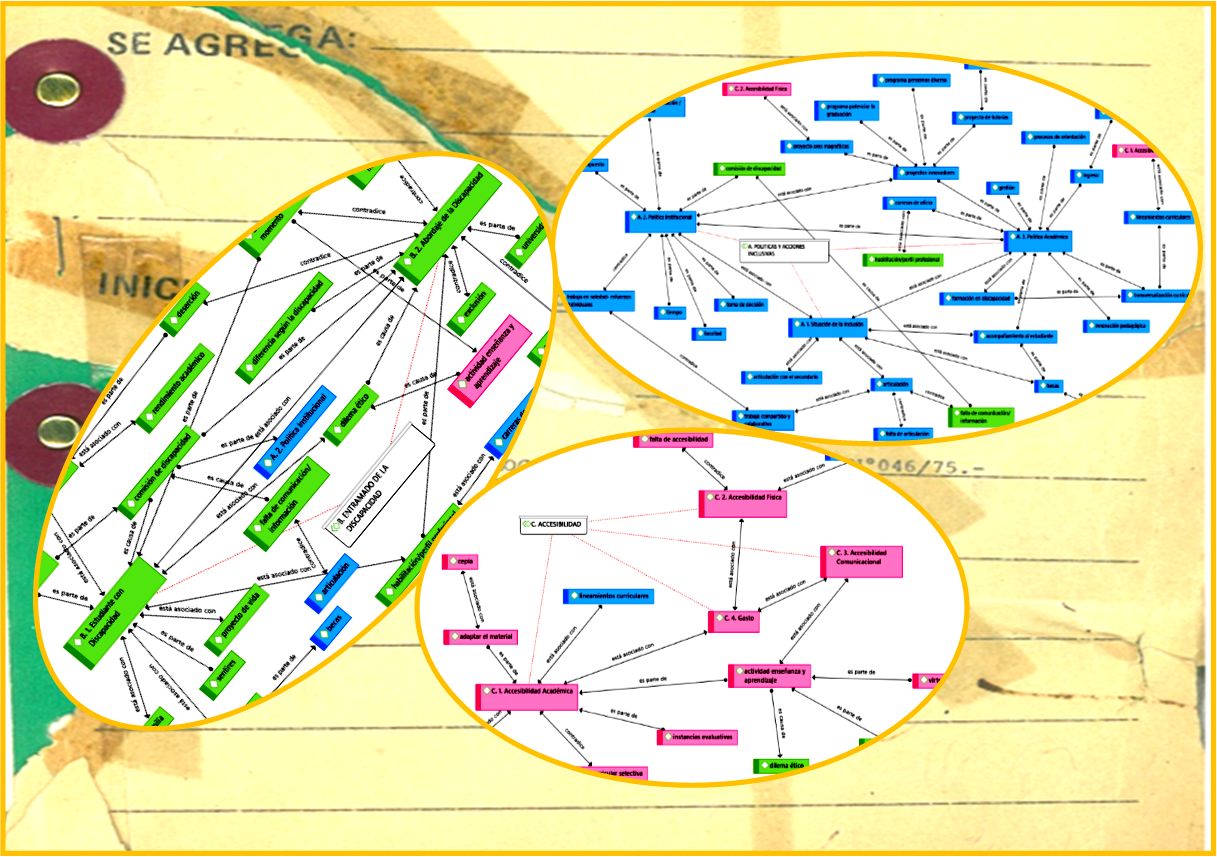INCLUSION OF STUDENTS WITH DISABILITIES AT THE NATIONAL UNIVERSITY OF RÍO CUARTO
Keywords:
educational inclusion, university, students with disabilitiesAbstract
The article will address, in the context of a research carried out at the National University of Río Cuarto, the educational reality of the inclusion of students with disabilities from the voices of actors involved in different management positions. To do this, in principle the proposed objectives will be explained, as well as the methodology assumed to carry out the study. Subsequently, returning in a general way to the construction of the categories developed from the analysis of the data, an attempt will be made to understand and explain the reality of this group, presenting partial progress of the research that is still in progress and is in the analytical stages of empirical evidence and the construction of theorizations in this regard.
Likewise, we can advance as an essential principle that emerges in said evidence, the conviction in reaffirming that the responsibility that the State and national universities must assume to guarantee equality of opportunities and conditions in access, continuity, and graduation for each student, is undoubtedly an axis that is not under discussion, although it is also evident that good intentions and good policies are not enough, that it is necessary to materialize in practice these precepts that, sometimes, encounter difficulties in their implementation.
Downloads
References
Ball, S. (1992). Textos, discursos y trayectorias. https://revistas.unc.edu
Barton, L. (1998). Discapacidad y Sociedad. Editorial Morata. Madrid.
Bracchi, C. (2016). Descifrando el oficio de ser estudiantes universitarios: entre la desigualdad, la fragmentación y las trayectorias educativas diversificadas. Trayectorias Universitarias, 2(3). https://revistas.unlp.edu.ar/TrayectoriasUniversitarias/article/view/3019
Cruz Vadillo, R. (2017). Las instituciones de educación superior y los estudiantes con discapacidad en México. http://publicaciones.anuies.mx/pdfs/revista/Revista181_S2A3ES.pdf
Goetz, J. y M. LeCompte. (1988). Etnografía y diseño cualitativo en investigación educativa. Madrid: Morata.
Grzona, A. y M. Moreno. (2014). El significado de la equidad en los estudios superiores para los estudiantes con discapacidad. Congreso Iberoamericano de ciencia, tecnología y educación. Buenos Aires. Argentina.
Litwin, E. (2008). El oficio de enseñar. Buenos Aires, Argentina: Paidós.
Maxwell, J.A. (1996). Quialitative research design. An interactive approach. Thousand Oaks, CA: Sage Publications.
Payá Rico, A. (2010). Políticas de inclusión educativa en América Latina. Revista Electrónica Educación Inclusiva, vol. 2, núm. 3, pp.125-142. http://www.ujaen.es/revista/rei/linked/documentos/documentos/10-8.pdf
Taylor, S.J. y Bogdan R. (1998). Introducción a los métodos cualitativos de investigación. España: Ediciones Paidós.
Vasilachis de Gialdino, I. (1992). Métodos cualitativos I. Los problemas teóricos-epistemológicos. Buenos Aires, Argentina: Centro Editor de América Latina.
Zárate-Rueda, R; S. Díaz-Orozco y L. Ortiz-Guzmán. (2017). Educación superior inclusiva: Un reto para las prácticas pedagógicas Revista Electrónica Educare, vol. 21, núm. 3, Septiembre-Diciembre, 2017, pp. 289-312. http://www.redalyc.org/articulo.oa?id=194154512014
Documentos
Conferencia Internacional de Educación: La educación inclusiva: el camino hacia el futuro. ONU. (Ginebra, 2008)
Conferencia Mundial sobre Educación para Todos. Declaración mundial sobre educación para todos. (Jomtien, 1990)
Ley de Educación Nacional N° 26.206 (2006). Argentina
Ley de Educación Superior N° 24.521 (1995) y su modificatoria Ley 25.573 (2002). Argentina
Ley N° 26.378 adhesión a la Convención sobre los Derechos de las Personas con Discapacidad. Argentina (2008). Argentina
Plan Estratégico Institucional (PEI) Universidad Nacional de Río Cuarto. 2017. https://www.unrc.edu.ar/descargar/pei-2017-2023.pdf

Downloads
Published
How to Cite
Issue
Section
License

This work is licensed under a Creative Commons Attribution-NonCommercial-ShareAlike 4.0 International License.
Atribución No Comercial Compartir Igual (by-nc-sa):
No se permitirá un uso comercial de la obra original, ni de las posibles obras derivadas, la distribución de las cuales se debe hacer con una licencia igual a la que regula la obra original.






